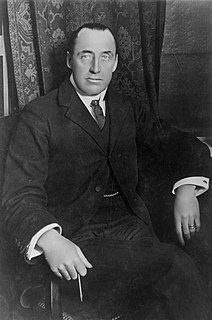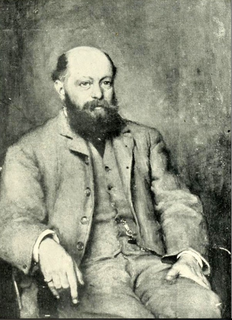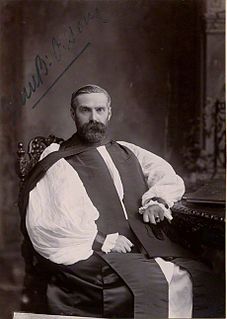Related Research Articles

Edward Henry Carson, Baron Carson, PC, PC (Ire), from 1900 to 1921 known as Sir Edward Carson, was an Irish unionist politician, barrister and judge, who served as the Attorney General and Solicitor General for England, Wales and Ireland as well as the First Lord of the Admiralty for the British Royal Navy. From 1905 Carson was both the Irish Unionist Alliance MP for the Dublin University constituency and leader of the Ulster Unionist Council in Belfast. In 1915, he entered the war cabinet of H. H. Asquith as Attorney-General. Carson was defeated in his ambition to maintain Ireland as a whole in union with Great Britain. His leadership, however, was celebrated by some for securing a continued place in the United Kingdom for the six north-eastern counties, albeit under a devolved Parliament of Northern Ireland that neither he nor his fellow unionists had sought. He is also remembered for his open ended cross examination of Oscar Wilde in a legal action that led to plaintiff Wilde being prosecuted, gaoled and ruined. Carson unsuccessfully attempted to intercede for Wilde after the case.

Michael Longley,, is an Anglo-Irish poet.

The Royal Belfast Academical Institution is an independent grammar school in Belfast, Northern Ireland. With the support of Belfast's leading reformers and democrats, it opened its doors in 1814. Until 1849, when it was superseded by what today is Queen's University, the institution pioneered Belfast's first programme of collegiate education. Locally referred to as Inst, the modern school educates boys from ages 11 to 18. It is one of the eight Northern Irish schools represented on the Headmasters' and Headmistresses' Conference. The school occupies an 18-acre site in the centre of the city on which its first buildings were erected.

Sir Thomas Drew was an Irish architect.
Bryn Cunningham is an Irish rugby union administrator and former player. He played fullback for Ulster, making 150 appearances between 1997 and 2010, and was the team's Player of the Year in 2002–2003. Since 2014 he has been responsible for player recruitment at Ulster, initially as Team Manager, later as Operations Director.
Jonathan Eric Bardon, was an Irish historian and author.

John Baptist Crozier was a Church of Ireland bishop. He served as Bishop of Ossory, Ferns and Leighlin (1897–1907), Bishop of Down, Connor and Dromore (1907–1911), Primate of All Ireland and Archbishop of Armagh (1911–1920).
Henry McDonald is a journalist and author. Formerly a correspondent for The Guardian and Observer, since 2021 he has been the political editor of The News Letter, one of Northern Ireland's national daily newspapers, based in Belfast.

Sir Anthony Brutus Babington PC (NI) was an Anglo-Irish barrister, judge and politician.

The Rt Rev Thomas Carson, LLD was a 19th-century Irish Anglican Bishop.
John Baxter was a former solicitor and unionist politician in Northern Ireland.

Kenneth Gibson was a Northern Irish politician who was the Chairman of the Volunteer Political Party (VPP), which he had helped to form in 1974. He also served as a spokesman and Chief of Staff of the loyalist paramilitary organisation, the Ulster Volunteer Force (UVF).
Norman Agnew was a unionist politician in Northern Ireland.
St John Drelincourt Seymour was an Irish Anglican priest in the first half of the 20th century who served as Archdeacon of Cashel and Emly.
Edward Henry Brien (1811-1902) was Archdeacon of Emly from 1858 until 1880.
Hamilton Townsend (1843-1895) was an Anglican priest in Ireland in the second half of the nineteenth century
Henry Stewart, D.D. was an Anglican priest in Ireland in the nineteenth century.
Henry Leslie, D.D. (1651-1733) was an Anglican priest in Ireland in the late seventeenth and early 18th centuries.
John Gibbs was an Archdeacon of Down from 1869 until his death.
John Chaine was an Irish Anglican priest.
References
- ↑ Leigh Rayment's Historical List of MPs – Constituencies beginning with "B" (part 2)
- ↑ "Alumni Dublinenses: a register of the students, graduates, professors and provosts of Trinity College in the University of Dublin (1593–1860)Burtchaell, G.D/Sadlier, T.U p324: Dublin, Alex Thom and Co, 1935
- ↑ The Belfast And Province Of Ulster Directory 1870, P132
- ↑ The Belfast And Province Of Ulster Directory 1877, P706
- ↑ 'Deaths' The Times London, England, Tuesday, Feb. 10, 1880 Issue 29800, p. 1